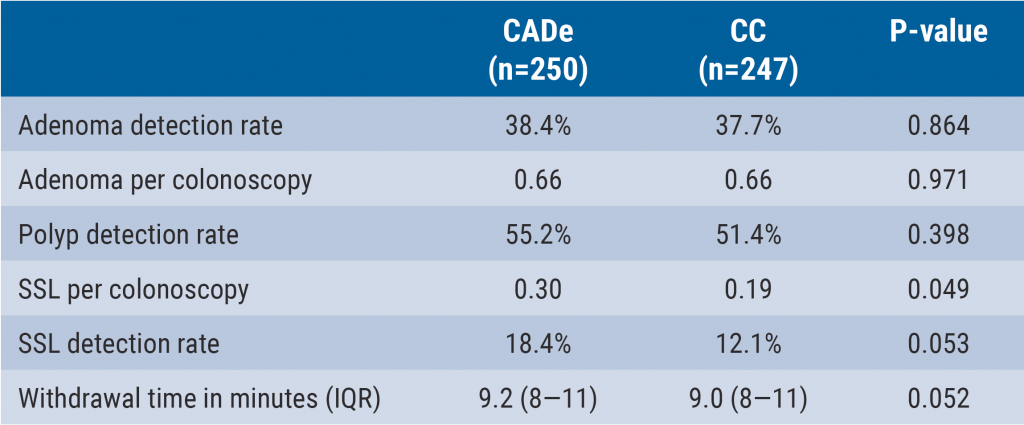https://doi.org/10.55788/e7cdceff
MK-7240 is an investigational monoclonal antibody inhibiting tumour necrosis factor-like cytokine 1A (TL1A)-mediated signalling. TL1A is an upstream regulator of pro-inflammatory cytokines and fibrosis signals. The phase 2 ARTEMIS-UC trial (NCT04996797) randomised 135 participants with moderately to severely active UC 1:1 to placebo or MK-7240 [1]. Participants in the active arm received 1,000 mg of this agent intravenously on day 1 and 500 mg every 4 weeks, starting from week 2. The primary endpoint was clinical remission per modified Mayo score (MMS) at week 12, defined as endoscopic subscore of 0 or 1, rectal bleeding subscore (RBS) of 0, and stool frequency subscore of 0 or 1 and not greater than baseline. Secondary endpoints included clinical response (defined as a decrease from baseline in the MMS of ≥30% and ≥2 points, and a decrease of ≥1 point in the RBS or an RBS ≤1), endoscopic improvement (i.e. endoscopy subscore ≤1 with no friability), and mucosal healing (Geboes score ≤2B.1 and endoscopy subscore ≤1). Dr Bruce Sands (Icahn School of Medicine at Mount Sinai, NY, USA) presented the main findings.
The primary endpoint was met, with 26.5% and 1.5% of the participants achieving clinical remission at week 12, favouring the active arm over the placebo arm (95% CI 13.9–36.6; P<0.0001). In addition, all secondary efficacy endpoints showed improvements with MK-7240 compared with placebo, including endoscopic improvement (36.8% vs 6.0%; 95% CI 17.4–43.2; P<0.0001), clinical response (66.2% vs 22.4%; 95% CI 27.4–56.9; P<0.0001), mucosal healing (30.8% vs 3.5%; 95% CI 14.3–39.6; P<0.0001), and inflammatory bowel disease questionnaire (IBDQ) response (82.4% vs 49.3%; 95% CI 17.2–46.8; P<0.0001). Moreover, the results appeared to be consistent in advanced therapy-experienced participants.
Adverse events (AEs) were observed in 40.3% and 41.2% of the participants in the placebo arm and experimental arm, respectively. Serious AEs were reported in 7.5% and 0.0% of the participants, numerically favouring the active arm over the placebo arm. Finally, the rates of infections and infestations were comparable, with 16.4% in the placebo arm and 14.7% in the MK-7240 arm.
In conclusion, MK-7240 showed encouraging efficacy and safety results in participants with moderately to severely active UC in this phase 2 study, instigating the launch of a phase 3 trial.
- Sands BE, et al. A phase 2, randomised, double-blind, placebo-controlled trial of PRA023 (MK-7240) as induction therapy in patients with moderately to severely active ulcerative colitis: ARTEMIS-UC, Cohort 1. OP102, UEG Week 2023, 14–17 October, Copenhagen, Denmark.
Copyright ©2023 Medicom Medical Publishers
Posted on
Previous Article
« Subcutaneous infliximab shows promise in UK IBD study Next Article
LUCENT trials: Mirikizumab works in UC, regardless of targeted therapy history »
« Subcutaneous infliximab shows promise in UK IBD study Next Article
LUCENT trials: Mirikizumab works in UC, regardless of targeted therapy history »
Table of Contents: UEGW 2023
Featured articles
SEQUENCE: Risankizumab doubles endoscopic remission rates compared with ustekinumab in CD
What’s New in Artificial Intelligence
Digital intervention relieves symptoms and improves QoL in IBS
GastroGPT: Successful proof-of-concept study of gastroenterology-specific large language model
Other Therapeutics and Outcomes
Primary results from MAESTRO-NASH trial: resmetirom efficacious for NASH
Apraglutide: Advancing the treatment of short bowel syndrome
Endobiliary radiofrequency ablation in pCCA: a pilot study
Raising awareness for microscopic colitis: disease course and predictors
Outcomes of IBD Trials
DIVERSITY1: Filgotinib results in Crohn’s disease leave investigators puzzled
SEQUENCE: Risankizumab doubles endoscopic remission rates compared with ustekinumab in CD
Guselkumab provides benefits in UC regardless of advanced therapy history
INSPIRE: Risankizumab meets all efficacy endpoints in UC
Risankizumab resolves extraintestinal manifestations in CD
Obefazimod takes the spotlight as promising UC treatment
Rapid response to upadacitinib boosts outcomes in severe Crohn’s disease
LUCENT trials: Mirikizumab works in UC, regardless of targeted therapy history
ARTEMIS-UC: New kid in town for UC
Breakthroughs in Colorectal Lesions
Safer removal of large polyps with cold snare technique
Higher recurrence rates with cold snare EMR than with conventional EMR
How to deal with at-risk patients above the CRC screening age limit?
European CRC screening needs to be revised
Advances in Upper Endoscopy and Colonoscopy
Epinephrine boosts efficiency in gastric ESD
Artificial intelligence-aided colonoscopy did not improve outcomes in Lynch syndrome
Can computer technology improve our everyday colonoscopy results?
Is AI-assisted colonoscopy ready for clinical practice?
Should we use E-SEMS or EVT for traumatic oesophageal perforations?
Related Articles

December 7, 2023
Can computer technology improve our everyday colonoscopy results?
December 7, 2023
Is AI-assisted colonoscopy ready for clinical practice?
© 2024 Medicom Medical Publishers. All rights reserved. Terms and Conditions | Privacy Policy

